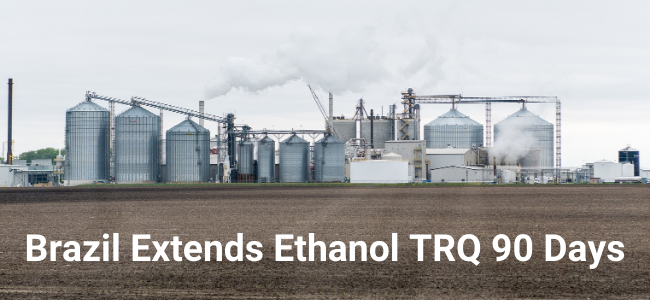After expiring on Aug. 31 – prompting a 20 percent tariff to be temporarily applied to U.S. ethanol entering that country – Brazil’s tariff rate quota (TRQ) has been extended for 90 days, starting Sept. 14.
The Office of the U.S. Trade Representative made the announcement late Friday, indicating discussions with Brazil about a long-term solution would continue over the 90-day period.
Ryan LeGrand, U.S. Grains Council (USGC) president and chief executive officer, and leaders at USGC ethanol industry partners Growth Energy, the Renewable Fuels Association (RFA) and the National Corn Growers Association (NCGA) issued a joint statement in reaction, noting the challenges inherent in the decision but vowing to continue cooperation with the process toward a workable solution.
“[We] believe the 90-day extension of the TRQ serves neither Brazil’s consumers nor the Brazilian government’s own decarbonization goals, especially while Brazil’s ethanol producers continue to be afforded virtually tariff-free access to the U.S. market,” they said. “The extension falls during Brazil’s annual inter-harvest period when U.S. ethanol exports to Brazil are traditionally low, causing greater uncertainty for U.S. exporters looking to make selling decisions now for the traditionally higher Brazilian demand in the winter months.
“While the Brazilian ethanol market has not been fully reopened to imports, we appreciate the continued support and efforts of the U.S. government as we use this 90-day period to aggressively pursue an open and mutually beneficial ethanol trading relationship with Brazil.”
The industry groups also spoke to their efforts to work with the public and private sectors to find a solution that will allow open trade of ethanol with Brazil.
“The U.S. ethanol industry actively sought, through repeated dialogue with local industry and government, to illustrate the negative impacts of tariffs on Brazilian consumers and the Brazilian government’s own decarbonization goals. However, it seems Brazil’s government has left its own consumers to pay the price through higher fuel costs once again,” they said.
“While we would have preferred Brazil abandon its ethanol import tariffs entirely and resume its free trade posture on ethanol, which it held for several years before the TRQ, we view its decision to temporarily extend the TRQ on ethanol at the current level as an opportunity to continue discussions toward that end.”
The full industry statement is available here.
The USTR statement is available here.
About The U.S. Grains Council
The U.S. Grains Council develops export markets for U.S. barley, corn, sorghum and related products including distiller’s dried grains with solubles (DDGS) and ethanol. With full-time presence in 28 locations, the Council operates programs in more than 50 countries and the European Union. The Council believes exports are vital to global economic development and to U.S. agriculture’s profitability. Detailed information about the Council and its programs is online at www.grains.org.

